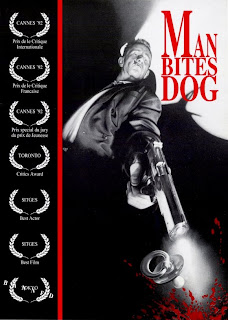
Man Bites Dog
Directed by: Remy Belvaux, Andre Bonzel, and Benoit Poelvoorde
Starring: Benoit Poelvoorde
Released: 1992
Country of Origin: Belgium
Runtime: 95 min.
If someone knows they are being filmed, can you ever consider the footage you obtain, "real?" Does anyone really act like their everyday self when they know other people will view what's being recorded? This is something I've often contemplated in regards to "reality shows." I think 99% of what you see would be considered, at least in part, a performance rather then anything resembling reality. Whether its video or a photo, there's an unconscious need to look and act our very best, the elements of ourselves that we want the world to see. If that is true, can we really consider a documentary to be an accurate portrayal of anything, or do we only see fractions of the whole truth. This, and many other questions are raised in the violent faux-documentary Man Bites Dog.
Man Bites Dog wastes no time in establishing the nature of what we're dealing with, within seconds the film's subject violently strangles a woman on a train. This is Ben, he's a wildly charismatic serial killer and is currently joined by three documentary filmmakers. They follow him as he shows them around town, introduces his family and friends, and educates us on the correct ratios for ballasting bodies so they sink in water. Ben is kind of a giant dork, he's constantly reciting poetry and even stops to admire a couple of birds in a factory while in hot pursuit of his next kill. He muses on whatever pops in his head, and considers himself a bit of a socialite, regularly attending art shows and other social events. Ben isn't your typical movie serial killer, he doesn't hide his trade and at times seems oddly proud of it. He's also funny and a little likable, which in itself is a bit of an uncomfortable conflict. At first the film crew comes across as interested observers, but soon get caught up in the chaos and begin participating in the horrid slaughters. On the surface, it's a simple film but it's implications are deep and unnerving.
The film acts as a statement not only on the nature of documentaries, but also the morbid fascination viewers have with violent images. With the rise of so-called "torture-porn" films, Man Bites Dog takes on an almost prophetic edge. Films of that nature sell tons of tickets because people want to see death, and they want to see it in a way that tops the last in terms of depravity. Watch a few of the more mainstream horror films from the 80's and compare them to what we have now, it's quite the shocker. Our culture's acceptance of brutal and sadistic killing on screen has hit a level I would have never anticipated. It's not like films such as Hostel didn't exists in the 80's, it's just they weren't made with huge budgets and marketed at the mass audiences of giant theater companies. To see a film like that you either had to see it on video, or a small niche theater with a couple dozen like-minded gore-fiends. I don't want to sound over judgmental, you could easily say I'm no different in this area. I liked both Hostel films, and I honestly can't say it was for artistic reasons. They shocked me and pushed the boundaries, something I admire and enjoy quite a bit. However, I've never been your typical movie fan, it's the fact that "normal" people have decided this is OK and acceptable that bothers me. I like media that crosses lines, but living in a society where these works are met with increasing popularity, kind of freaks me out. So, at what point do we begin to worry about what people consider entertainment?
Another question raised in the film is, when does objectivity become immoral in a journalistic setting? Most would consider what happens in Man Bites Dog, a definite point in which someone should step in and stop what's going on. If that's the case, should documentarians step in regarding other crimes, or is it just murder? It's a journalist's job to stay objective, but at what point should normal human decency trump that ideal. On the surface, it seems like an obvious question, but the more you ponder it, the more difficult it becomes. Also, at what point does an observer become implicit in what he sees, or does the umbrella of journalism cover any of our moral obligations. Man Bites Dog is a very exaggerated take on these questions, but it'll have you thinking for days to come.
FINAL VERDICT: I can't say I recommend this to everyone. While it raises some interesting questions, it's a film that stands mostly on it's statement. Films with such a strong message can sometimes drown their entertainment value in conveying what it's trying to say. It's better in my opinion, to make a film that may have a deep message, but also retains it's entertainment value for those not interested in things like metaphors. That's not saying this is a preachy film, it's not, but it's definitely one built to foster thoughts and discussions rather than a fun ride. If your looking for a popcorn movie, this isn't it. But if you interested in films that challenge the way you think and look at different aspects of life, this one will definitely get you and your friends talking. After this you might also check out Michael Haneke's Funny Games, which further explores the nature of watching violent images. I won't get into much of that film, but it's brilliant and a little insulting.

Haneke’s movies seem to cast a light sociopathic or sadistic behavior upon him as an individual. Susan Sontag's On Photography publication is a wonderful theory of how a camera shields us from morbid reality. I watched Man Bites Dog many years ago. I felt it was a limp attempt to throw nasty voyeurism desires of humans at an audience expecting a more "artful" take on the matter. French cinema is just as guilty of scraping viewers' senses. (Irreversible and Water Lillies being contemporary examples.) BTW, I watch too many damn movies. =P
ReplyDelete-Reba